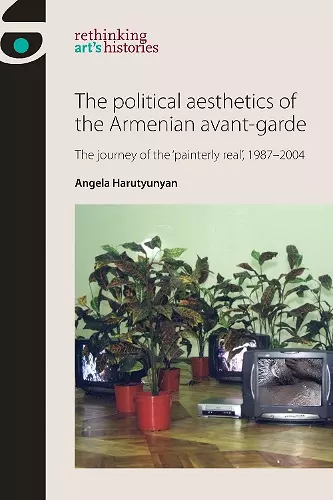The Political Aesthetics of the Armenian Avant-Garde
The Journey of the 'Painterly Real', 1987–2004
Format:Paperback
Publisher:Manchester University Press
Published:29th Mar '19
Currently unavailable, and unfortunately no date known when it will be back

This book addresses late-Soviet and post-Soviet art in Armenia in the context of turbulent transformations from the late 1980s to 2004. It explores the emergence of 'contemporary art' in Armenia from within and in opposition to the practices, aesthetics and institutions of Socialist Realism and National Modernism. This historical study outlines the politics (liberal democracy), aesthetics (autonomous art secured by the gesture of the individual artist), and ethics (ideals of absolute freedom and radical individualism) of contemporary art in Armenia and points towards its limitations. Through the historical investigation, a theory of post-Soviet art historiography is developed, one that is based on a dialectic of rupture and continuity in relation to the Soviet past. As the first English-language study on contemporary art in Armenia, the book is of prime interest for artists, scholars, curators and critics interested in post-Soviet art and culture and in global art historiography.
‘Angela Harutyunyan’s book is unprecedented in providing a historical mapping of the complex dynamics of the emergence and development of contemporary art practices in late-Soviet and post-Soviet Armenia. The constitutive tensions between aesthetic concerns and political imperatives are here revealed through the concept of the “painterly real”. The author employs the concept, a fundamentally poetic construct, for historically situating the artistic avant-gardes and their claims for autonomy within the turbulent transformations of everyday life marked by the paradigmatic process of the disintegration of the Soviet and its aftermath.’
Vardan Azatyan, Associate Professor of Art History at the Yerevan State Academy of Fine Arts, Armenia
‘Angela Harutyunyan’s book is foundational to understanding contemporary, post-Cold War art, and specifically, the contemporary art world in Armenia. In an extremely precise manner the author explains the transitions of contemporary Armenian art. In an analytical way she presents an archaeology of concepts and practices that traces the continuities and breaks within and between the cultural logic of the late Soviet and post-Soviet, East and West, local and global art worlds. She has introduced, reinterpreted and re-read concepts characteristic of late Soviet and post Soviet art in Armenia such as contemporary, the avant-garde, the "painterly real", "pure creation", art and the politics of crisis.'
Miško Šuvakovic, Professor of Theory of Art and Media in the Faculty of Media and Communications at Singidunum University, Belgrade
'If you look for a reliable native informant who will enhance your knowledge on the art of the post-communist East and so help you make the history of contemporary art more inclusive, don’t read this book. If, on the contrary, you expect to find between its covers yet another challenge to the grand narrative of the Western art history, one that struggles for recognition by insisting on its otherness, then this book is not for you either. Angela Harutyunyan writes for those who still follow Fredric Jameson’s old advice: “Always historicize!” For that’s exactly what she did herself—brought art and history together in an experience of transformative praxis that might be shared anywhere on Earth.'
Boris Buden
‘In the multidisciplinary field of art history and criticism, The political aesthetics of the Armenian avant-garde: The journey of the ‘painterly real,’ 1987–2004 places new emphasis on rethinking the socialist past through the lens of aesthetic theory. Importantly, this goes beyond the normalised perception of the Soviet or post-Soviet critical art that is constructed dominantly through hegemonic narrative of the Russian avant-garde, Sots art, and nonconformist art. Harutyunyan’s book offers to recognise the varied distinctions, such as geopolitics, culture discourses, and identity politics, have to be drawn when working with the Soviet past and post-Soviet present in avant-garde artistic practices.’
Marianna Hovhannisyan, University of California, Field: A Journal of Socially-Engaged Art Criticism, Issue 10, Spring 2018
‘Writing an art historical account of a period of political transition, in addition to the epistemological difference of attempting to do so while using the dominant vocabulary of the Western art historical discourse, remains an unresolved challenge for all of us in the field. As a first attempt at historicizing recent alternative artistic practice in Armenia, Harutyunyan’s The Political Aesthetics of the Armenian Avant-Garde is an impressive venture, and highly informative on artistic practices of the twenty-year period in question.’
Duygu Demir, Art Journal Open, May 2019
ISBN: 9781526139368
Dimensions: 234mm x 156mm x 22mm
Weight: 608g
320 pages